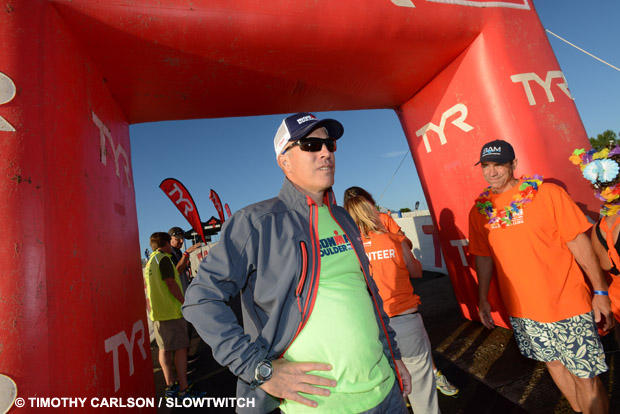Prize Money
I propose we look at pro triathletes, and the prize money offered them, in a different light. Large prize purses have been around since the early years of tri and I think most old-time triathletes would agree on certain truisms, the first of which is that money beyond a certain threshold does not increase age-group participation rates. The races in the U.S. with the largest historic participation have been the Chicago Triathlon (now Life Time Chicago) and Wildflower Triathlon. These have moderate purses. The Malibu Triathlon, Nation’s Tri, Life Time South Beach, were never big prize money races.
Certain races were built by big prize money. HyVee and the Life Time Minneapolis are obvious examples. But the over-the-top purses eventually come down to earth. There have been many, many more big money races that have failed to generate participant interest.
Why does someone become a pro? Andrew Messick, Ironman’s chief executive, was unfairly pilloried by a number of people when he answered that question, “We don’t know why people choose to be professional triathletes… I don’t know why.” What he meant was, the number of reasons a person decides to race as a pro are legion. There is no monolithic reason a person decides to race pro.

Flipping this around, why does an RD decide on a specific prize purse?
There are two kinds of “money” out there, what I’ll call open- versus closed-system. A closed-system prize money scheme is one in which the race itself generates the prize money. There is no “ulterior motive” for closed-system money. No Mister Moneybags throwing money into the purse with no rational business motive. No business investing in a huge prize purse under some assumption that the return on invested prize purse dollar will sell more yogurt or real estate transactions or timeshares. Invariably open-system prize purses do not last and often the entire race collapses.
I favor a closed-system paradigm for prize purses, where the race itself generates and justifies the size of the purse. Ironman is an example. Its races justify the purse (at least until recently). Challenge is another example, usually. The one outlier is Challenge Bahrain.
I consider the largest of the ITU events marginally open-system, that is to say, the prize purse is not necessarily funded by the economic fundamentals of the race. One frequent Slowtwitch forum member recently incepted a thread entitled, The market has spoken, a sprint tri should pay the winner $19,000. Was it really the market that spoke? When USA Triathlon put up a large prize purse for a WTS race in San Diego, that race was a financial disaster just when considered on its merits. The Chicago WTS race contested this year, perhaps that was a market success (I haven’t seen a financial analysis of that specific event). The age group race accompanying that pro race was very successful. But the Stockholm event that just paid out a $19,000 check to the male and female winners of a sprint triathlon may or may not have been justified by the sponsor, TV and entry revenues of the event.

Broadway composer and lyricist Stephen Sondheim cautioned about motives when reminiscing about an early failure of his: “We did it out of expediency and to make money. It was easy to write but had no passion and no blood. There was no reason for it to be. I learned the only reason to write is for love. Failure taught me you write out of passion.”
History strongly suggests that our sport’s monuments were built on a foundation of passion. An RD’s passion is contagious, and that passion is reproduced in his core constituency. A large prize purse won’t generate that passion. It won’t detract from it, but it won’t create it.
Then why have prize money at all? It lubricates the “standard”. People are fond of saying they care only about their own race, and not what anyone else does. Hogwash. It isn’t enough simply to go the distance. Maybe the first time around. Not the second. While your chief goal might be to surpass your previous best, you also want to where your best is situated in the grand scheme.
Your own interest in how you measure up joins another motive: You, I, most of us want to see just what is achievable. We take pleasure in greatness, even when the exhibition of human potential exposes our own relative weakness. The demonstration of that potential costs. We won’t see it unless we pay for it.
There are any number of valid motivations for becoming a pro athlete, but the reality for most is that it’s just not possible to reach your potential unless you are compensated. In Guns, Germs, and Steel and his other anthropological best sellers Jared Diamond explains the concept of specialization. The real advances in human achievement occurred only when humans stopped the habit of everyone equally sharing in all tasks. The concept of taxation is, then, probably 15,000 years old. You have an aptitude for fighting. You train full time to become a warrior, I’ll spend all my time husbanding animals for food, and I’ll share my largess with you.
When you contest in a beloved event about which you are passionate, the natural evolution of that event will include specialization. Even if that event begins with no prize money – maybe the best way for a race to begin – at some point a passion will become a movement as the specialist sets the standard.
When a farmer pays a “tax” to the warrior it’s not because he feels the warrior deserves to be paid. It’s not philanthropy. It’s not because he feels sorry for the warrior. He pays the warrior because he, the farmer, benefits. My thesis is that the chief beneficiary of the prize money is not the pro. It’s you and me. When an RD invests his race with a rational purse scaled and calibrated to the size and stature of the event it’s not because he cares about the pro, but because he cares about the experience of everyone paying to enter his race.
When large race enterprises establish prize purses that are either very obviously too high or low, that is not the market at work. That is the use of prize money as a tactical weapon in some struggle disconnected with the specific race itself.
Most observers of the sport know when prize money is out of whack. Whether or not we always realize it, we place a premium on predictability, growth, longevity. It does the sport marginal good to have $500,000 or $1 million purse one year only to see that purse halved or eliminated 2 or 3 years later. It also disserves an event's constituents when that race organically earns and therefore deserves a significant purse, but has its purse diminished or eliminated because of some global brand strategy.
A rationale approach to prize money will, in the end, pay more overall money to our sport's pros while creating a stronger foundation for robust and durable races.




Start the discussion at slowtwitch.northend.network